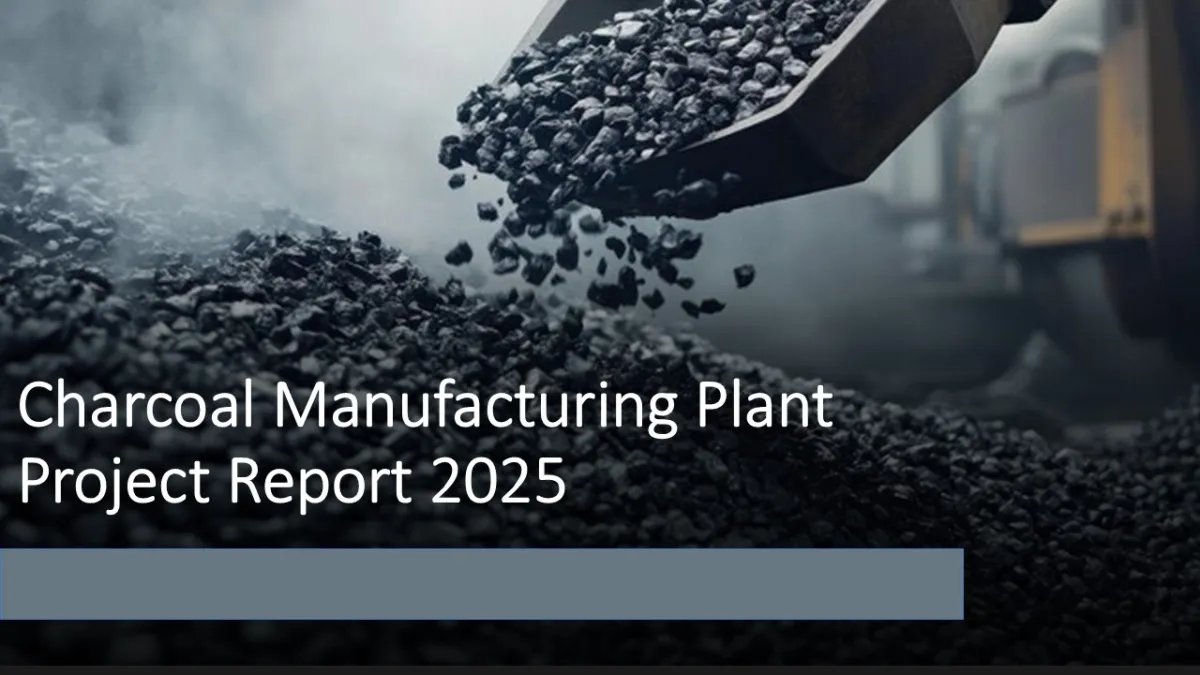
Charcoal Manufacturing Cost Report 2025: Plant Setup & Profitability Roadmap For Investors
Setting up a charcoal manufacturing plant involves establishing facilities for carbonization, processing, and quality control while adhering to strict safety and environmental standards. The process requires advanced machinery, skilled labor, raw material sourcing, and compliance with environmental regulations.
IMARC Group's report, titled “Charcoal Manufacturing Plant Project Report 2025: Industry Trends, Plant Setup, Machinery, Raw Materials, Investment Opportunities, Cost and Revenue,” provides a complete roadmap for setting up a charcoal manufacturing plant. It covers a comprehensive market overview to micro-level information such as unit operations involved, raw material requirements, utility requirements, infrastructure requirements, machinery and technology requirements, manpower requirements, packaging requirements, transportation requirements, etc.
Request for a Sample Report : https://www.imarcgroup.com/charcoal-manufacturing-plant-project-report/requestsample
Charcoal Industry Outlook 2025:
The charcoal industry outlook for 2025 reflects strong growth driven by rising adoption of charcoal across residential, commercial, and industrial applications. Increasing demand for longer burning times, efficient heating, and higher energy density is fueling advancements in activated charcoal, compressed charcoal, and emerging biomass carbonization technologies. Expanding use cases in grilling, metallurgy, water filtration, and industrial heating are boosting production volumes and innovation. Governments and private players are investing in research and sustainable manufacturing practices to address safety and environmental concerns. With technological breakthroughs and wider commercialization, the industry is expected to achieve significant expansion and enhanced competitiveness in 2025.
Key Insights for Charcoal Manufacturing Plant Setup:
Detailed Process Flow:
-
Product Overview
Unit Operations Involved
Mass Balance and Raw Material Requirements
Quality Assurance Criteria
Technical Tests
Project Details, Requirements and Costs Involved:
-
Land, Location and Site Development
Plant Layout
Machinery Requirements and Costs
Raw Material Requirements and Costs
Packaging Requirements and Costs
Transportation Requirements and Costs
Utility Requirements and Costs
Human Resource Requirements and Costs
Capital Expenditure (CapEx) and Operational Expenditure (OpEx) Analysis:
Project Economics:
-
Capital Investments
Operating Costs
Expenditure Projections
Revenue Projections
Taxation and Depreciation
Profit Projections
Financial Analysis
Profitability Analysis:
-
Total Income
Total Expenditure
Gross Profit
Gross Margin
Net Profit
Net Margin
Key Cost Components of Setting Up a Charcoal Plant:
-
Land and Infrastructure: Acquisition of land, construction of factory buildings, and utility installations.
Machinery and Equipment: Investment in carbonization kilns, crushing units, briquetting equipment, and packaging systems.
Raw Materials: Procurement of wood biomass, agricultural waste, coconut shells, binders, and packaging materials.
Labor and Workforce: Hiring skilled engineers, technicians, and operators along with training costs.
Research and Development: Expenses for product innovation, efficiency improvements, and safety testing.
Regulatory Compliance: Certifications, safety protocols, and environmental management systems.
Working Capital: Inventory management, logistics, and day-to-day operational expenses.
Economic Trends Influencing Charcoal Plant Setup Costs 2025:
-
Raw Material Price Volatility: Fluctuations in biomass, wood waste, and agricultural residue prices impact overall production costs.
Energy Costs: Rising electricity prices and demand for renewable power sources increase operational expenses.
Supply Chain Disruptions: Global logistics challenges and material shortages affect procurement and lead times.
Inflationary Pressures: Higher construction, labor, and equipment costs due to inflation raise capital requirements.
Government Incentives: Subsidies, tax benefits, and green energy policies help offset setup costs.
Technological Advancements: Automation and efficiency improvements reduce long-term expenses despite higher initial investments.
Speak to an Analyst for Customized Report : https://www.imarcgroup.com/request?type=report&id=10476&flag=E
Challenges and Considerations for Investors in Charcoal Plant Projects:
-
High Capital Intensity: Significant upfront investment required for infrastructure, technology, and skilled workforce.
Raw Material Dependency: Reliance on biomass sources like wood and agricultural waste, subject to seasonal supply risks.
Technological Uncertainty: Rapid advancements in carbonization and alternative fuel technologies may shorten product lifecycles.
Regulatory Compliance: Strict safety, environmental, and quality standards add complexity and costs.
Market Competition: Growing number of entrants in charcoal manufacturing intensifies price and margin pressures.
Sustainability Concerns: Need for eco-friendly production methods and waste management solutions to meet ESG expectations.
Conclusion:
The charcoal industry in 2025 presents significant opportunities driven by expanding charcoal applications and rapid technological advancements. Establishing a manufacturing plant requires careful consideration of capital investment, raw material security, regulatory compliance, and evolving market demands. While rising costs, supply chain constraints, and sustainability challenges pose risks, supportive government policies and innovations in carbonization technology provide strong growth prospects. Investors who strategically plan for efficiency, innovation, and environmental responsibility can position themselves competitively in this fast-growing sector, aligning with the increasing global demand for reliable and high-performance charcoal fuel solutions.
About Us:
IMARC Group is a global management consulting firm that helps the world's most ambitious changemakers to create a lasting impact. The company excel in understanding its client's business priorities and delivering tailored solutions that drive meaningful outcomes. We provide a comprehensive suite of market entry and expansion services. Our offerings include thorough market assessment, feasibility studies, company incorporation assistance, factory setup support, regulatory approvals and licensing navigation, branding, marketing and sales strategies, competitive landscape, and benchmarking analyses, pricing and cost research, and procurement research.
Contact Us:
IMARC Group
134 N 4th St. Brooklyn, NY 11249, USA
Email: sales[@]imarcgroup.com
Tel No:(D) +91 120 433 0800
United States: (+1-201971-6302)
Legal Disclaimer:
MENAFN provides the
information “as is” without warranty of any kind. We do not accept
any responsibility or liability for the accuracy, content, images,
videos, licenses, completeness, legality, or reliability of the information
contained in this article. If you have any complaints or copyright
issues related to this article, kindly contact the provider above.


















Comments
No comment